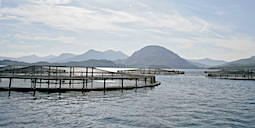Production of Atlantic salmon in Scotland increased by 26,890 tonnes (16.5%) to 189,707 tonnes in 2017 — the highest ever level.
The value of the Atlantic salmon produced rose 37% to more than £1 billion last year.
Marine Scotland Science on Monday published the Scottish Fish Farm Production Survey 2017.
Production tonnage of rainbow trout decreased by 6% in 2017 to 7,637 tonnes.
Brown trout/sea trout production increased from 41 tonnes in 2016 to 61 tonnes in 2017.
During 2017, there was also an increase in the production of cleaner fish (lumpsucker and wrasse) which are used as biological controls for parasites.
Highlands and Islands Enterprise recently reported that employment in the salmon farming industry and the wider supply chain topped 10,000 full time equivalent jobs.
Rural Economy Secretary Fergus Ewing said: “The fish farm industry forms an integral part of Scotland’s rural economy – creating jobs and providing capital in some of our most rural communities.
“So it’s very encouraging to see salmon production value on the increase yet again …
Gilpin Bradley, chairman of the Scottish Salmon Producers Organisation (SSPO) said: “2017 was a successful year for Scottish salmon farmers.
“Volumes were strong and exports reached an all-time high with sales of £600m to more than 50 countries worldwide.
“This is testament to the hard work and commitment of so many dedicated salmon farmers in the Highlands and Islands and the global recognition of Scottish salmon’s enviable premium market position.
“Demand for quality Scottish salmon continues to outstrip supply and the sector aspires to grow to meet demand, but we also recognise the importance of steady, sustainable development.
“These new figures, alongside the investment in tackling emerging challenges give us great confidence in the sector’s ability for sustainable growth over the coming years.”
Charlotte Wright, chief executive of Highlands and Islands Enterprise said: “These figures are good news for Scottish aquaculture and show the significant social contributions the industry makes to remote rural, island and coastal areas by supporting high-skilled jobs, diversifying and protecting communities.
“Salmon farming is a major contributor to the Highlands and Islands economy and brings additional business opportunities to the area.
“We have supported the aquaculture industry since its inception and as a vital sector which provides many jobs for rural communities.”
Bradley added: “Salmon farmers have invested more than £60m in new technologies and improved farming techniques, research projects and cleaner fish to remove naturally occurring sea lice which thrive in the warmer temperatures.
“Farmers continue to work hard to improve fish health and salmon survival and we are seeing benefits coming from the new innovations.
“It is encouraging to see that the report confirms an improvement in the industry’s survival figures as a result of the ongoing investment in this area.”
